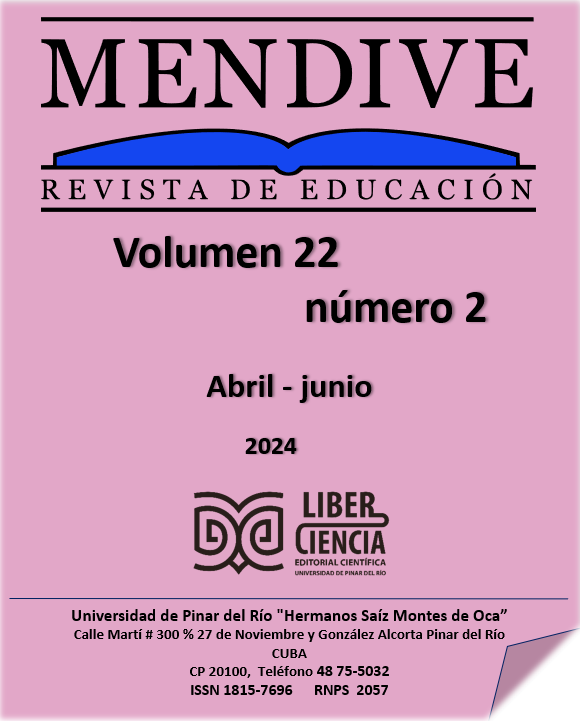Atención a educandos con dificultades en el aprendizaje. Programa para profesores de inglés en formación
Contenido principal del artículo
Resumen
La atención a educandos con dificultades en el aprendizaje que estudian inglés, exige de un profesor de lengua extranjera entendido en recursos y apoyos necesarios. El objetivo del estudio fue evaluar el efecto de la aplicación de un programa de asignatura en el currículo propio de la carrera Licenciatura en Educación Lenguas Extranjeras, Inglés, en el proceso de formación de pregrado de estos profesores para la atención a educandos primarios con dificultades en el aprendizaje que estudian inglés. Se empleó una investigación de enfoque mixto, de tipo experimental, a partir del paradigma emergente dialéctico-materialista. El programa de asignatura de 22 horas clases se impartió en modalidad presencial. Se utilizó una muestra intencional no probabilística, integrada por 31 estudiantes a los que se les aplicó el programa, 8 profesores y 7 directivos. Los datos se recopilaron mediante entrevistas y encuestas pre-test y post-test, procesadas mediante la triangulación metodológica de fuentes. La aplicación de la prueba t-Student arrojó diferencias estadísticamente significativas en la muestra después de aplicado el programa (Zp=18,0545 ≥ Z=2.457), lo cual demostró su efectividad. Los hallazgos revelan que la adecuada formación de pregrado proveída al profesor de inglés tiene relación con el aumento de conocimientos, habilidades y actitudes positivas hacia la atención a estos educandos. Se concluye que el diseño de programas de asignaturas futuras para el pregrado de estos profesionales debe potenciar el aprovechamiento de los componentes académico, laboral e investigativo con estos fines.
Descargas
Detalles del artículo

Esta obra está bajo una licencia internacional Creative Commons Atribución-NoComercial 4.0.
Citas
Flaten Jarsve, C., & Tsagari, D. (2022). Dyslexia and English as a Foreign Language in Norwegian Primary Education: A Mixed Methods Intervention Study. Center for Educational Policy Studies Journal, 12(4), 155-180. https://doi.org/10.26529/cepsj.1459
Francés, L., Quintero, J., Fernández, A., Ruiz, A., Caules, J., Fillon, G., Hervás, A. y Soler, C. V. (2022). Current state of knowledge on the prevalence of neurodevelopmental disorders in childhood according to the DSM-5: a systematic review in accordance with the PRISMA criteria. Child and Adolescent Psychiatry and Mental Health, 16(1). https://doi.org/10.1186/s13034-022-00462-1
Kormos, J. (2017). The Effects of Speciûc Learning Difûculties on Processes of Multilingual Language Development. Annual Review of Applied Linguistics, 37(2017), pp. 3044. https://doi.org/10.1017/S026719051700006X
Kormos J., & Nijakowska, J. (2017). Inclusive practices in teaching students with dyslexia: Second language teachers' concerns, attitudes and self-efficacy beliefs on a Massive Open Online Learning Course. Teaching and Teacher Education, 68, 3041. http://doi.org/10.1016/j.tate.2017.08.005
Mendoza ZúñigaM., Enríquez O'FarrilI., & López PavónL. (2022). Actitudes de profesores de lenguas extranjeras hacia la enseñanza inclusiva del inglés a educandos con dificultades en el aprendizaje Contexto cubano. Órbita Científica, 28(119). http://revistas.ucpejv.edu.cu/index.php/rOrb/article/view/1687
MES. (2016). Plan de estudio "E" Carrera Licenciatura en Educación Lenguas Extranjeras. Cuba. La Habana: MES. https://docplayer.es/71669897-Republica-de-cuba-ministerio-de-educacion-superior-plan-de-estudio-carrera-licenciatura-en-educacion-lenguas-extranjeras.html
Miesera, S. & Gebhardt, M. (2018). Inclusive vocational schools in Canada and Germany. A comparison of vocational pre-service teachers2 attitudes, self-efficacy and experiences towards inclusive education. European Journal of Special Needs Education, 33(5). https://doi.org/10.1080/08856257.2017.1421599
Nijakowska, J., Kormos, J., Hanusova, S., Jaroszewicz, B., Kálmos, B., Imrene Sarkadi, A., Pižorn, K. (2015). DysTEFL2 Dislexia for english language teachers as a foreign language. Self-study curse. DysTEFL, Trainee's Bookle. https://www.d-all.gr/wp-content/uploads/2018/06/DysTEFL_Booklet_Trainee.pdf
Nijakowska, J., Tsagari, D. & Spanoudis, G. (2019). Foreign language teachers' preparedness to cater for special educational needs of learners with dyslexia: a conceptual framework, European Journal of Special Needs Education, 34:2, 189-203, https://org/10.1080/08856257.2019.1581401
Nijakowska, J., Tsagari, D., & Spanoudis, G. (2020). Cross-country comparison of EFL teacher preparedness to include dyslexic learners: Validation of a questionnaire. Studies in Second Language Learning and Teaching, 10, 779805. http://dx.doi.org/10.14746/ssllt.2020.10.4.6
Nijakowska, J. (2022). Foreign language trainee teachers' concerns and preparedness to implement inclusive instructional practices with learners with special educational needs: training induced changes. Neofilolog, (58/2), 161-178. https://doi.org/10.14746/n.2022.58.2.2
Sparks, R., & Ganschow, L. (1991). Foreign Language Learning Difficulties: Affective or Native Language Aptitude Differences? Modern Language Journal, 75, 3-16. http://dx.doi.org/10.1111/j.1540-4781.1991.tb01076.x
Sparks, R. (2021). Perspectives on L2 Learning and Learning Disabilities: Individual Differences, Diagnosis, and Teaching Strategies. Babylonia Journal of Language Education, 2, 1421. https://doi.org/10.55393/babylonia.v2i.54
UNESCO IBE. (2022). Reaching out to all learners: a resource pack for supporting inclusion and equity in education. Geneva: International Bureau of Education http://www.ibe.unesco.org/en/news/reaching-out-all-learners-resource-pack-supporting-inclusion-and-equity-education


